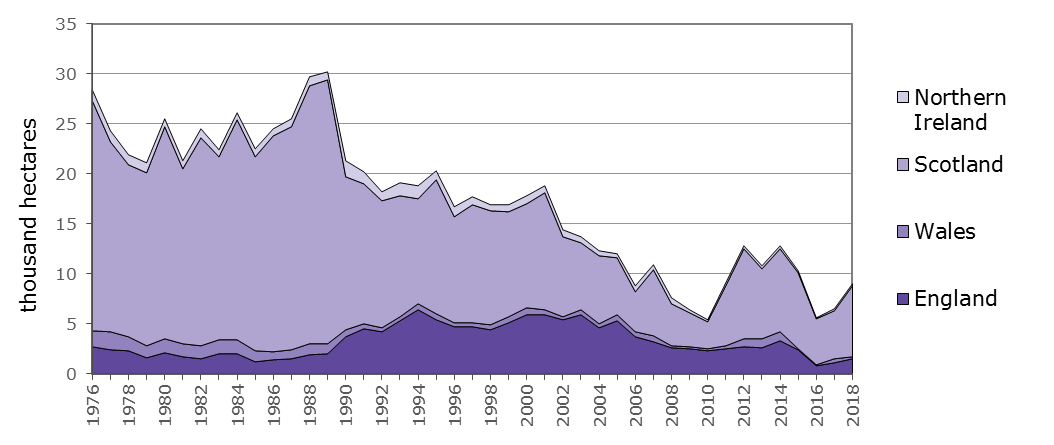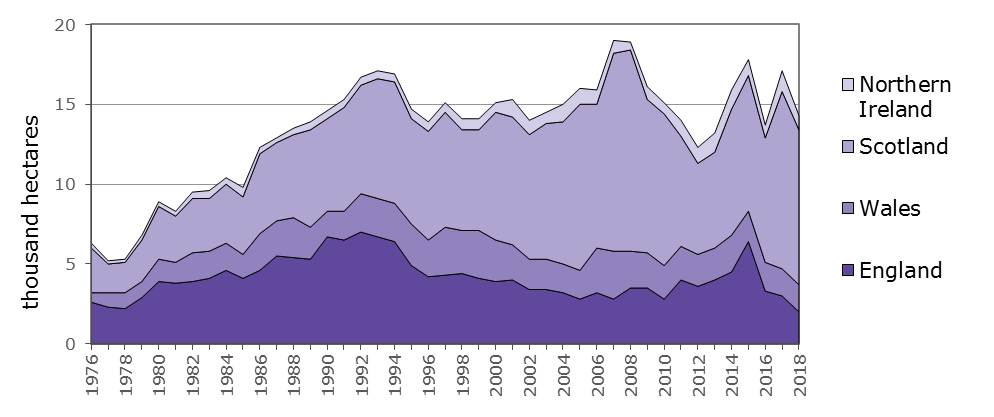Figure 1.6 shows areas of new planting by country since the year ending March 1976. UK new planting rates have fallen from the late 1980s, decreasing by 82% between 1988-89 and 2009-10. This followed changes to the tax benefits from owning forestry in the UK, introduced in the 1988 Finance Act (www.legislation.gov.uk/ukpga/1988/39/contents).
The area of new planting in the UK between 2010-11 and 2014-15 was around twice the level of that reported in 2009-10. This increase was largely driven by increases in Scotland following the introduction of Rural Development Contracts. New planting decreased in 2015-16 to levels similar to that reported in 2009-10. This decrease is likely to have been influenced by recent changes in grant schemes across the UK.
At 9.1 thousand hectares in 2017-18, the current level of new planting represents a 40% increase from the 6.5 thousand hectares achieved in 2016-17. For further information, see the New Planting and Restocking section of the Sources chapter.
Figure 1.6 New planting in the UK, 1976-2018

Source: Forestry Commission, Natural Resources Wales, Forest Service, grant schemes.
Notes:
1. Private sector figures are based on areas for which grants were paid during the year and, for England includes new planting supported by the Woodland Trust, by Natural England and by the Environment Agency, and land acquired by the National Forest Company. Figures for grant aided planting under Rural Development Contracts in Scotland relate to calendar years.
2. Estimate of areas planted without grant aid are also included (where possible) up to 2009-10. For Scotland, a small amount of new planting without grant aid was also included for 2016-17. As a result, the reported figures are likely to under-estimate the true level of planting activity.
3. The planting season lies both sides of 31 March, and the weather can cause planting to be advanced or delayed.
4. Includes woodland formed by natural colonisation.
Figure 1.7 shows areas of restocking by country since the year ending March 1976. It indicates an increase in restocking rates over most of the period. Over the same period, there has been a general increase in UK wood production (see UK-Grown Timber chapter).
The reported area of restocking fell significantly after a peak of 19 thousand hectares in 2006-07. This followed changes to grant support for restocking in Scotland, that resulted in some non-grant aided Sitka spruce restocking being excluded from the estimates. Results from the Forestry Commission’s Nursery Survey (an annual survey of forest nurseries in Great Britain) indicate that, despite a dip in the 2009/10 planting year, sales of Sitka spruce plants to Scotland have been relatively stable in recent years and have been increasing each year since the 2011/12 planting year.
The chart shows that the reported area of publicly funded restocking in 2017-18 represents a 16% decrease from the previous year. For further information, see the New Planting and Restocking section of the Sources chapter.
Figure 1.7 Restocking in the UK, 1976-2018

Source: Forestry Commission, Natural Resources Wales, Forest Service, grant schemes.
Notes:
1. Private sector figures are based on areas for which grants were paid during the year. Figures for grant aided planting under Rural Development Contracts in Scotland relate to calendar years.
2. Estimate of areas planted without grant aid are also included (where possible) up to 2009-10, but no estimates are available since then. Figures from 2010-11 therefore only cover restocking that took place on FC/NRW/FS land and restocking that took place on private sector land with public funding. As a result, the reported figures are likely to under-estimate the true level of planting activity.
3. The planting season lies both sides of 31 March, and the weather can cause planting to be advanced or delayed.
4. Includes woodland restocked by natural regeneration.
Sources chapter: New planting & restocking